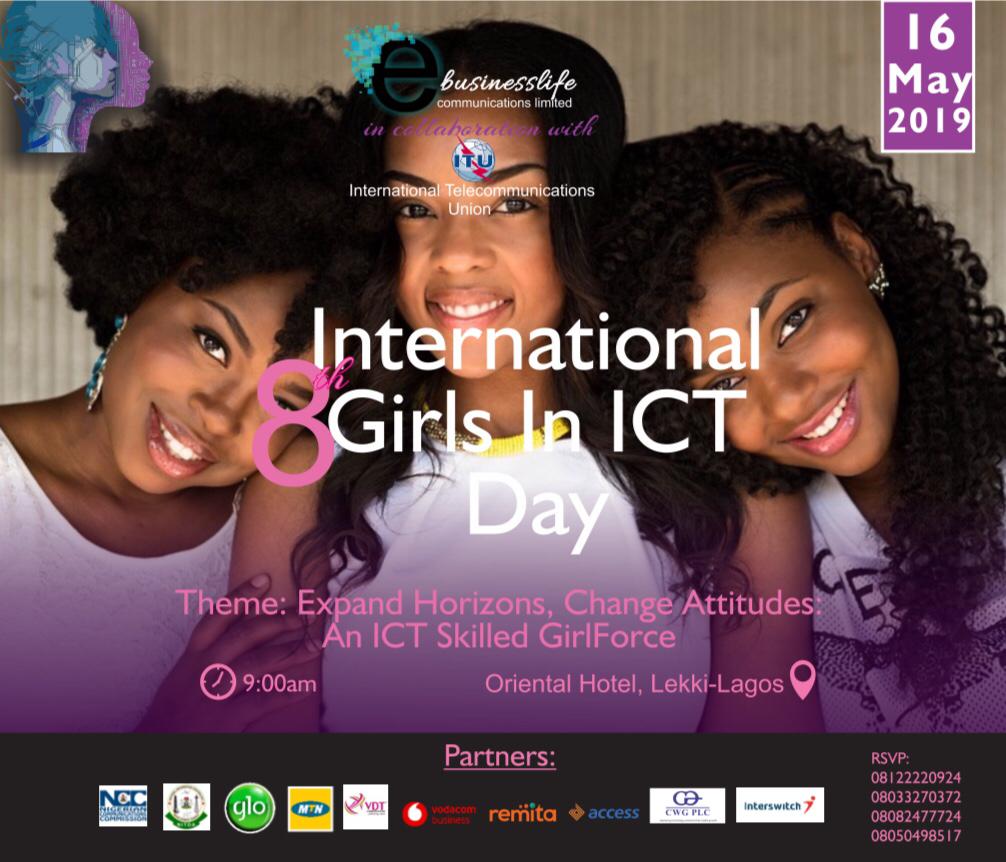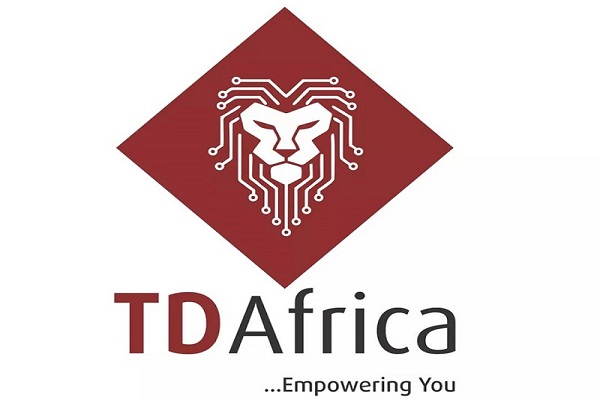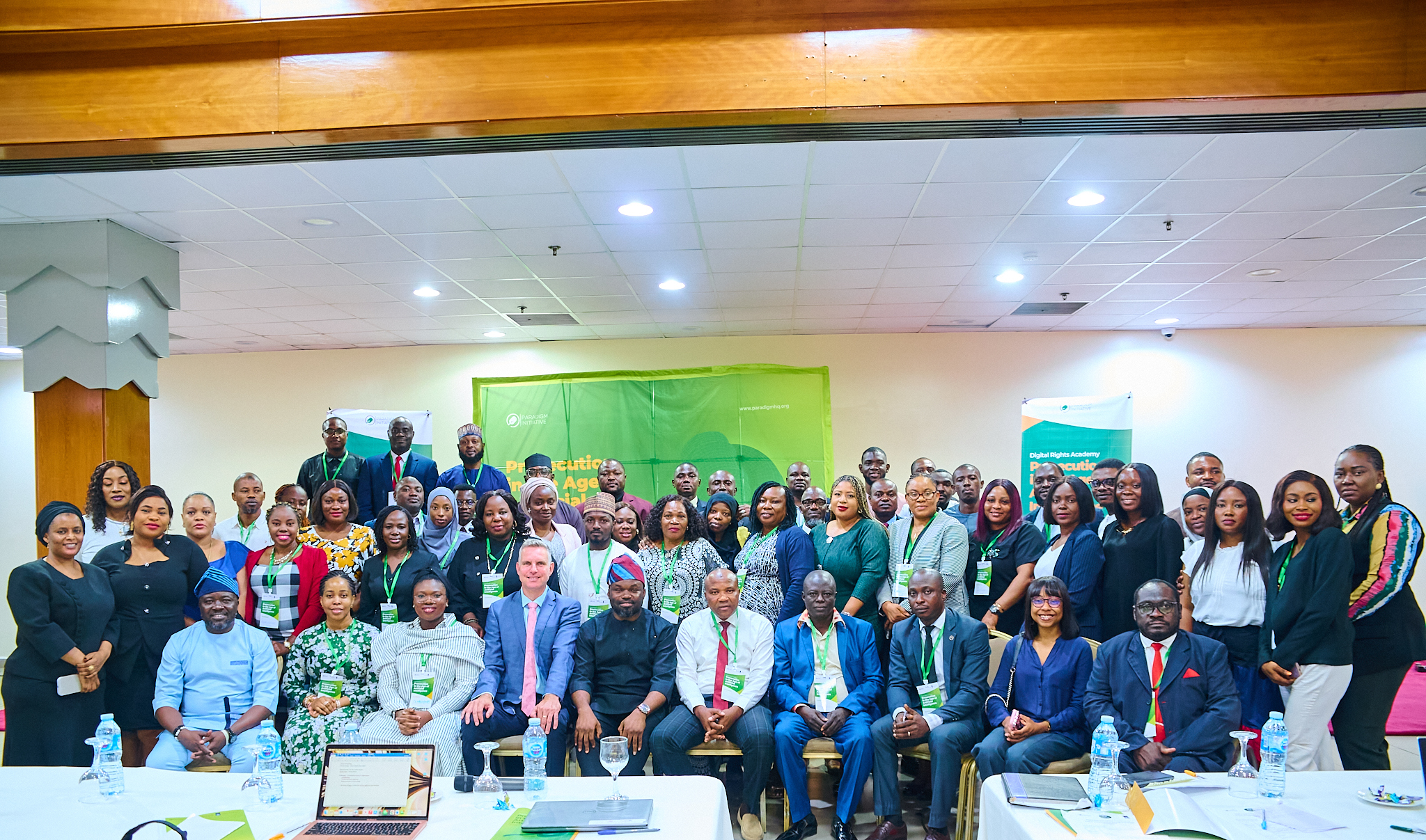Telecom
ICT Regulators, Others Reiterate Need to Encourage GIrls in ICT

Information and communication Technology (ICT) stakeholders have reemphasized need for more girls to take up ICT skills so as to remain employable in the ever evolving ICT environment.
They disclosed this at the International Girl-in-ICT day event, organised by eBusinesslife Communications Limited, held in Lagos.
Speaking at the event, Prof. Umar Garba Danbatta, Executive Vice Chairman/CEO, Nigerian Communications Commission (NCC) urged the girl child not to let her gender be a limitation but rather, an asset that will enable her achieve whatever she set out to do.
Danbatta represented by Mrs Iyabo sholanke, Director of Projects, Nigerian Communications Commission (NCC) said that it’s imperative that we empower and encourage girls and young women to consider careers in the growing field of Information and communication Technology (ICTs) so as remain employable in a male dominated field.
According to him, “Indeed your gender should never be a limitation for you but rather an asset.
“This is even truer of women who are natural leaders, planners, administrators and strategic thinkers.
“That is why in the modern world we have great women doing great things, Today, the Chief Operating Officer (COO) of face book as well, CEO IBM, CO-CEO Oracle are all women.
“In Nigeria women are making great waves in the ICT sector, the CEO of Main One Cable, Funke Opeke is a woman.
“Your race and your gender are not limiting factors to your capacity and the potential role you can play in the digital space today”
Dr Isa Ali Ibrahim Pantami, Director-General, National Information Technology Development Agency (NITDA) stated that its time for the girl child to embrace the needed skills to compete in this 21st century labour market, noting that the current environment is different from the 1990s.
Represented by Dr Falilat Jimoh, Department of information technology infrastructure Solution, NITDA, Pantami noted that supporting the girl child is one cardinal role of the agency in building a knowledge base society.
According to him, “We have made deliberate and continuing efforts at improving the capacity of government to deliver on its mandate.
“By promoting government digital services, we are opening up grand opportunities for young innovators to help government agencies solve their IT based problem.
“We have given concessions to female applicants for our graduate internship scheme (GIS) training aimed to train Nigerian youths on geo-political zones basis.
Pantami assured that with the requisite skills, Nigerian girls can chart their own causes, build sustainable businesses and even solve national problems.
He noted that they are committed to providing platform that would unleash the creative genius of the girl child in order for them to reach the pristine heights they dream to attain.
“We are committed to providing the platform that would unleash the creative genius of our ‘GirlForce’, in order for them to reach the pristine heights they dream to attain.
“We have been striving hard to reverse the exclusion of many Nigerians from the digital revolution going on.
“We realized that women and girls have somewhat been excluded from the ongoing IT revolution.
“This is most obvious in the rural areas where culture, poor infrastructure and low-literacy has increased the digital divide,” he added.
Speaking earlier, Mrs Ufuoma Emuophedaro, Convener Girls in ICT and Publisher, E-Business Life Communication Limited, said that international girls in ICT day is an initiative of the international telecommunications union aimed to create a global environment that empowers and encourages girl and young women to consider careers in the growing field of ICTs.
She explained that this initiative will counter the chronic global decline in the number of female ICT students.
Emuophedaro noted that it is estimated that within the next 10 years, there will be more than 2 million technology jobs that cannot be filled because of lack of qualified ICT specialist.
She stressed that this predicted global shortfall could be bridged if concerted efforts are made to empower and encourage girls and young women to consider careers in the growing field of ICTs.
Telecom
TD Africa Secures AI ISO Certifications

TD Africa, Sub-Saharan Africa’s leading technology distributor, has once again raised the bar for the continent’s digital transformation journey by attaining the ISO 42001 (Artificial Intelligence Management Systems) and ISO 27701 (Privacy Information Management Systems) certifications.

These globally recognized certifications, which set the highest benchmarks for responsible AI deployment and data privacy, position TD Africa as a pioneer in preparing Africa for an AI-powered future.
Speaking on the milestone, Mrs. Chioma Ekeh, CEO of TD Africa, stated: “These certifications are not just badges of compliance; they reflect our deep commitment to building Africa’s digital resilience with trust, governance, and accountability at the core. At TD Africa, we believe Africa must not remain a passive consumer of global innovation but must actively shape and co-create solutions that reflect our unique realities. From financial inclusion to agriculture, healthcare, and digital governance, AI presents limitless opportunities—our role is to ensure Africa is prepared to harness them responsibly.”
ISO 42001 provides the world’s first governance framework for the ethical and transparent deployment of artificial intelligence, ensuring solutions align with human values and global best practices. On the other hand, ISO 27701 guarantees that TD Africa manages personal data with unmatched integrity and security. This is an essential pillar in a time where data privacy is increasingly under threat.
For nearly three decades, TD Africa has anticipated and shaped the future of technology on the continent, not by chasing trends, but by building enduring structures. Beyond its certifications, the company has invested in world-class infrastructure, resilient distribution systems across 47 African countries, and a thriving technology ecosystem. Its TecHerdemy program has empowered over 400 women in technology, further cementing its position as a catalyst for inclusive digital growth.
With trusted partnerships with global technology leaders, TD Africa has consistently delivered on its promise to bridge global innovation with African realities. The attainment of these ISO certifications reinforces its ability to responsibly distribute and support advanced AI technologies across its vast network of resellers.
As the world prepares for the dawn of Artificial General Intelligence (AGI) with breakthroughs such as GPT-5, TD Africa is ensuring that Africa is not left behind. The certifications demonstrate the company’s readiness to give Africa not just access to innovation, but the muscle, discipline, and confidence to use it sustainably.
“This achievement is not just about TD Africa,” Mrs. Ekeh added. “It is a milestone for Africa. The global AI conversation cannot be left to Silicon Valley or Beijing alone. Lagos, Nairobi, Accra, Kigali, and Johannesburg must also have a strong voice. And TD Africa is proud to amplify that voice. We are no longer waiting for tomorrow to happen; we are preparing tomorrow, today.”
With this bold move, TD Africa has reaffirmed its legacy of leadership in technology distribution, while signaling a new era where Africa plays a decisive role in the global digital renaissance.
Telecom
Data Is Life: Why MTN Wants You to Get Smarter with Your Data

If there’s one thing we can all agree on, it’s this: life today runs on data. From morning Instagram scrolls to Zoom classes and late-night Netflix binges, we’re constantly plugged in, streaming, scrolling, and sharing. But if you’ve ever wondered, “Why does my data finish so fast?” or seen that dreaded low-balance pop-up just when you need it most, you’re not alone.

At MTN’s Customer Engagement Day 2025, Ugonwa Nwoye, MTN’s Chief Customer Relations and Experience Officer, addressed this reality in a way that felt both practical and deeply relatable. She spoke about how essential data has become, calling it the lifeblood of modern living. “If you don’t have data in today’s world, you feel cut off. Isolated. That’s how important connectivity is,” she said, capturing how many of us feel when we’re disconnected even for a moment.
Her words struck a chord, especially as she shared candidly about her own experiences. She reminded everyone that many apps continue to run in the background, consuming data without our knowledge, and how video-heavy habits, such as endless TikTok reels or video calls, can quickly drain data bundles.
But the heart of Ugonwa’s message wasn’t just about the challenges; it was about empowerment. She emphasised that MTN’s goal is not simply to sell data but to help customers use it better. She explained how MTN is equipping people with the tools they already have on their phones to track usage, teaching simple ways to control consumption and sharing practical tips for managing apps more effectively. “We’re not just telling you your data is finished,” she said. “We want you to know how it was used and how to make it last longer. It’s about giving you control.”
What stood out most was her willingness to listen. Throughout the session, she engaged directly with real complaints and questions from the audience, from why smaller bundles seem to finish faster, to teachers who spend entire days on Zoom, to concerns about coverage in certain areas. Ugonwa addressed each one, acknowledging frustrations and committing to follow up. “We hear you. From data issues to service gaps, we’re taking notes and acting. Your hustle is important to us, and our job is to enable it,” she reassured the room.
Her approach made it clear that MTN isn’t shying away from customer concerns but leaning into them. In a world where data has become as necessary as food and water, Ugonwa’s session felt like a much-needed reminder that while technology connects us, what really matters is how well it serves the people who rely on it every day. As she closed, the message was simple but powerful: MTN sees you, it hears you, and it is working to make sure your digital life is not just connected but smarter and more empowering.
Telecom
Paradigm Initiative Equips Prosecutors for the Digital Age of Crime

Paradigm Initiative is organising a capacity-building workshop to empower government prosecutors to prosecute cases committed through or facilitated by digital technologies, specifically examining new Artificial Intelligence (AI) trends in alignment with constitutional provisions and international human rights standards.

The two-day workshop in Abuja, Nigeria, is being held under the theme, “Prosecution in the Age of Artificial Intelligence.” It is organised by Paradigm Initiative with support of the Kingdom of the Netherlands under the Stemming the Tide of Abuse in Nigeria’s Digital Space (STANDS) Project. Drawing from new trends in the growing integration of artificial intelligence (AI) and digital systems into public administration and criminal investigations, it aims to find a balance through deep examination and understanding of how these technologies function, the new risks they pose, and the necessary safeguards to ensure that citizens’ fundamental rights remain protected.
This workshop comes at a crucial time, as criminal procedure laws have yet to fully catch up with the realities of the digital age and the evolving ways in which offences are committed. Increasingly, digital platforms are weaponised against victims, violating their privacy and exposing them to harm. With emerging technologies, these threats are becoming more sophisticated, placing mounting pressure on prosecutors to deliver results.
Speaking at the workshop’s opening, Khadijah El-Usman, Paradigm Initiative’s Senior Programmes Officer for Anglophone West Africa and lead on the workshop, highlighted that failure to build this capacity now risks widening the gap between the speed of technological change and the legal system’s ability to respond. This could lead to ill-equipped prosecutors, unintended violations of rights during investigations, and a further loss of public trust in the justice system.
She added, “By investing in targeted training, we can ensure prosecutors are not only keeping pace with emerging threats but are also positioned to advocate for evolving laws in the space.”
In his remarks, the deputy ambassador of the Kingdom of the Netherlands Embassy to Nigeria, Robert Sonnemans, praised the way in which Nigeria is embracing the digital age and the opportunities that come with it. “Artificial intelligence is a clear example of both promise and risk, holding immense potential to strengthen investigations and improve access to justice, but also pressing questions on how to ensure fairness and prevent bias or misuse.
The Deputy Director, Department of Public Prosecution of the Federation, Barrister Ali Baba Rijaiu, urged participants to embrace the training, in his words, “the work we do shapes the trust of citizens in the justice system. If we rise to the demand of this digital age, we will not only defeat crime, we will also safeguard freedom and show that justice in Nigeria is not left behind by technology but strengthened by it.”

 Telecom3 days ago
Telecom3 days agoNCC Claims to Have Eliminated Unregistered SIMs from Telecoms Networks

 Telecom3 days ago
Telecom3 days agoAliyu Aboki Applauds Broadband Mapping as About Expanding Opportunity in Africa

 Telecom2 days ago
Telecom2 days agoFG Scraps 5 Percent Telecom Excise Duty Under New Tax Law

 E-Financial3 days ago
E-Financial3 days agoUBA Secures N5Bn BoI Fund to Boost Women Entrepreneurs, Others

 Telecom3 days ago
Telecom3 days agoMTN Group Restructures Executive Team, Appoints Toriola VP for Francophone Africa

 News3 days ago
News3 days agoTelcos See Biggest Growth Post-COVID – ALTON

 General News3 days ago
General News3 days agoVirtual Reality in Healthcare: Nigeria’s Untapped Opportunity for Training, Patient Care, and Medical Innovation

 News3 days ago
News3 days agoNITDA, Bauchi State Partner on Digital Literacy and Skills Framework
























